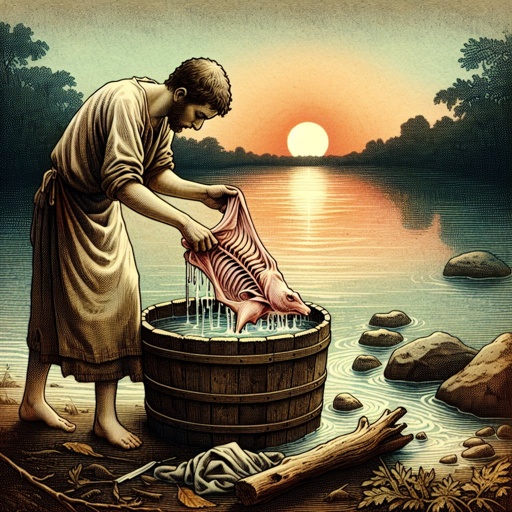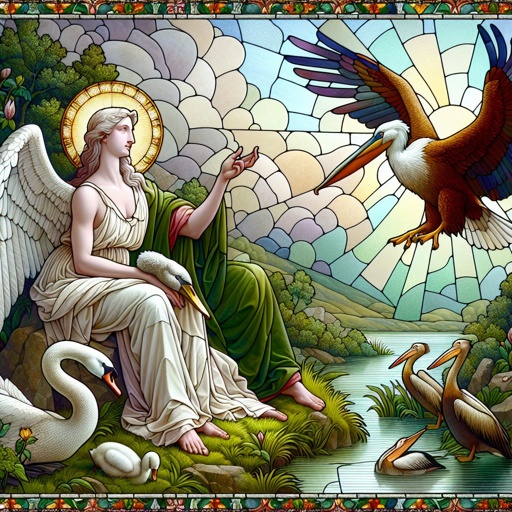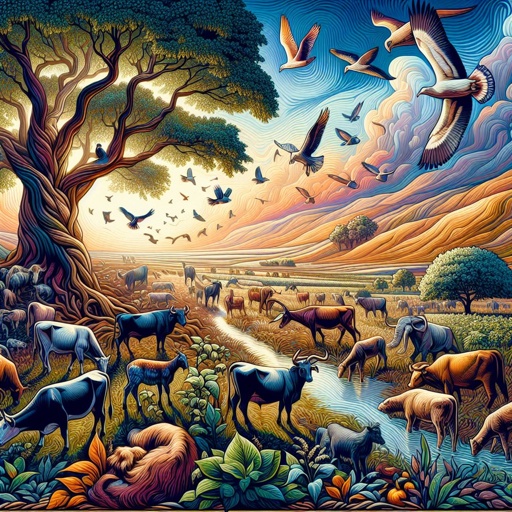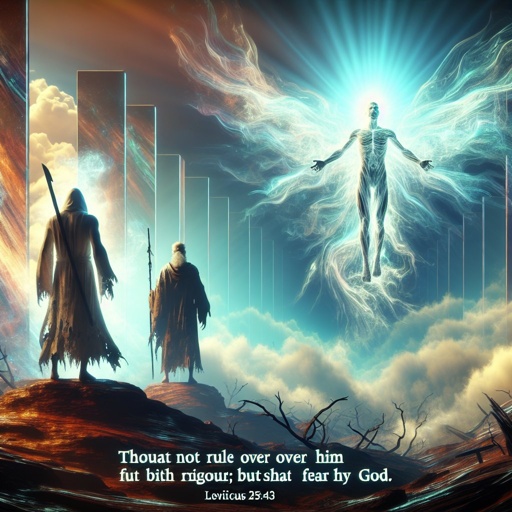What does Leviticus 11:25 mean?
"And whosoever beareth ought of the carcase of them shall wash his clothes, and be unclean until the even." - Leviticus 11:25

Leviticus 11:25 - "And whosoever beareth ought of the carcase of them shall wash his clothes, and be unclean until the even."
Leviticus 11:25 in the King James Version of the Bible states, "And whosoever beareth ought of the carcase of them shall wash his clothes, and be unclean until the even."
This verse is part of the regulations in Leviticus concerning clean and unclean animals. The Israelites were given specific guidelines about what animals they could eat and what animals were considered unclean. This verse specifically addresses the uncleanness that comes from touching the carcass of an unclean animal.
In order to understand the meaning and commentary of this verse, it is important to consider the context in which it was written. Leviticus is the third book of the Old Testament and it is primarily concerned with the laws and rituals that the Israelites were to follow in order to maintain holiness and purity. The book is attributed to Moses and is considered part of the Torah, which is the first five books of the Hebrew Bible.
The regulations regarding clean and unclean animals in Leviticus were meant to set the Israelites apart from the surrounding pagan cultures. By adhering to these dietary restrictions, the Israelites were demonstrating their faithfulness to God and their commitment to holiness. The concept of being clean or unclean was not just about physical hygiene, but also about spiritual purity and moral uprightness.
In the specific verse of Leviticus 11:25, the mention of washing clothes and being unclean until the evening is significant. This illustrates the seriousness of coming into contact with the carcass of an unclean animal. The act of washing one's clothes was a symbolic gesture of purification, a way of removing the defilement that had been acquired. The uncleanness lasting until evening suggests a temporary state of impurity, which could be atoned for through ritual purification.
The theme of holiness and separation from the world is central to the regulations in Leviticus, including the laws regarding clean and unclean animals. The Israelites were called to be a holy nation, set apart for God's purposes. By obeying these dietary laws, they were demonstrating their commitment to God and their willingness to be different from the nations around them.
There is also a spiritual symbolism in the distinction between clean and unclean animals. The clean animals, such as cattle and sheep, were often used in sacrifices and offerings to God. They were considered pure and acceptable for worship. On the other hand, the unclean animals, such as pigs and shellfish, were not suitable for sacrifice and were therefore deemed impure.
This distinction between clean and unclean animals can also be seen as a foreshadowing of the spiritual cleansing that would be brought about by the coming of Jesus Christ. In the New Testament, Jesus is often referred to as the "Lamb of God" who takes away the sins of the world. His sacrificial death on the cross would provide a way for all people, not just the Israelites, to be cleansed from their impurity and be reconciled to God.
In conclusion, Leviticus 11:25 is a verse that is part of the larger context of regulations concerning clean and unclean animals. It reflects the Israelites' commitment to holiness and purity, as well as their distinctiveness from the surrounding nations. The symbolism of clean and unclean animals points to the spiritual truths of purification and atonement that would ultimately be fulfilled in the person of Jesus Christ. This verse serves as a reminder of the Israelites' covenant relationship with God and their call to live in obedience to His commands.
Leviticus 11:25 Artwork

Leviticus 11:25 - "And whosoever beareth ought of the carcase of them shall wash his clothes, and be unclean until the even."

Leviticus 25:11 - "A jubile shall that fiftieth year be unto you: ye shall not sow, neither reap that which groweth of itself in it, nor gather the grapes in it of thy vine undressed."

Leviticus 25:26 - "And if the man have none to redeem it, and himself be able to redeem it;"

Leviticus 25:34 - "But the field of the suburbs of their cities may not be sold; for it is their perpetual possession."

Leviticus 25:1 - "And the LORD spake unto Moses in mount Sinai, saying,"

Leviticus 11:18 - "And the swan, and the pelican, and the gier eagle,"

Leviticus 16:25 - "And the fat of the sin offering shall he burn upon the altar."

Leviticus 11:17 - "And the little owl, and the cormorant, and the great owl,"

Leviticus 11:14 - "And the vulture, and the kite after his kind;"

Leviticus 11:15 - "Every raven after his kind;"

Leviticus 11:30 - "And the ferret, and the chameleon, and the lizard, and the snail, and the mole."

Leviticus 25:24 - "And in all the land of your possession ye shall grant a redemption for the land."

Leviticus 25:13 - "In the year of this jubile ye shall return every man unto his possession."

Leviticus 25:23 - "¶ The land shall not be sold for ever: for the land is mine; for ye are strangers and sojourners with me."

Leviticus 25:7 - "And for thy cattle, and for the beast that are in thy land, shall all the increase thereof be meat."

Acts 11:25 - "Then departed Barnabas to Tarsus, for to seek Saul:"

Leviticus 25:43 - "Thou shalt not rule over him with rigour; but shalt fear thy God."

Leviticus 11:19 - "And the stork, the heron after her kind, and the lapwing, and the bat."

Leviticus 25:32 - "Notwithstanding the cities of the Levites, and the houses of the cities of their possession, may the Levites redeem at any time."

Leviticus 9:11 - "And the flesh and the hide he burnt with fire without the camp."

Leviticus 27:25 - "And all thy estimations shall be according to the shekel of the sanctuary: twenty gerahs shall be the shekel."

Leviticus 25:12 - "For it is the jubile; it shall be holy unto you: ye shall eat the increase thereof out of the field."

Leviticus 25:40 - "But as an hired servant, and as a sojourner, he shall be with thee, and shall serve thee unto the year of jubile:"

Leviticus 25:25 - "¶ If thy brother be waxen poor, and hath sold away some of his possession, and if any of his kin come to redeem it, then shall he redeem that which his brother sold."

Leviticus 11:16 - "And the owl, and the night hawk, and the cuckow, and the hawk after his kind,"

Leviticus 11:1 - "And the LORD spake unto Moses and to Aaron, saying unto them,"

Leviticus 25:42 - "For they are my servants, which I brought forth out of the land of Egypt: they shall not be sold as bondmen."

Luke 11:25 - "And when he cometh, he findeth it swept and garnished."

Leviticus 25:48 - "After that he is sold he may be redeemed again; one of his brethren may redeem him:"

Leviticus 25:19 - "And the land shall yield her fruit, and ye shall eat your fill, and dwell therein in safety."